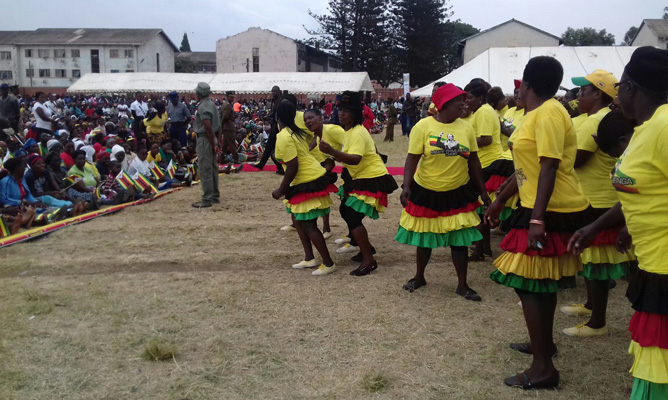
In May last year, an elderly Nyanga woman, Venencia Chitanda, collapsed and died while singing and dancing to welcome Vice-President Phelekezela Mphoko, who was set to address a campaign rally in the area on that day.
BY JAIROS SAUNYAMA
Chitanda (68), according to sources, had been gyrating since morning before she collapsed and died. VP Mphoko donated $500 towards her funeral.
The case of Chitanda typifies how Zimbabwean women have been reduced to cannon fodder for politicians as they swell the numbers at rallies and often constitute the biggest chunk of voters yet they remain confined to insignificant positions .
The number of women in high profile positions is still very low despite women constituting the greater part of the population.
During rallies, women have turned to singing, bootlicking male politicians and dancing.
During the run-up to the 2013 harmonised elections, a 52-year-old Harare woman also died at a Zanu PF rally addressed by President Robert Mugabe at Chibuku Stadium in Chitungwiza.
Zimbabwe Women in Politics Alliance director Linda Masarira, said gender inequality was fuelled by the patriarchal society which is employing divide and rule tactics meant to keep women down.
- Chamisa under fire over US$120K donation
- Mavhunga puts DeMbare into Chibuku quarterfinals
- Pension funds bet on Cabora Bassa oilfields
- Councils defy govt fire tender directive
Keep Reading
“Women are affected mainly by stereotyping, culture and retrogressive backgrounds that glorify patriarchy. They were raised to be second class to men and as such lack confidence. The other challenge facing women is the pull-her-down syndrome which is fuelled mainly by rich men who use money to divide and rule women,” she said.
“Lack of resources has also affected the rise of women politically as most of them get lured into bed by powerful politicians during election time to campaign thus reducing their bargaining power and voice in Parliament once elected into office.”
Masarira said ignorance was also a contributing factor as most female politicians did not invest in self-development.
“There is need to educate women on their rights and gender issues and to capacitate them to efficiently participate in decision making processes and get fully involved in governance issues,” she said.
Section 17 of the Constitution states that: “The State must promote full gender balance in Zimbabwean society and in particular … must … take all measures including legislative measures needed to ensure women constitute at least half of the membership of all commissions and all elective and appointed governmental bodies established by or under this Constitution or any Act of Parliament.”
In 2004, history was made when Joice Mujuru was appointed the Vice-President, a move that was described by many as a milestone towards achieving gender equality in the country. However, 10 years down the line, the dream was shattered as Mujuru was fired from the party and replaced by males – Mphoko and Emmerson Mnangagwa.
Recently, the MDC-T pulled a shocker after party leader Morgan Tsvangirai appointed two male vice-presidents, Nelson Chamisa and Elias Mudzuri at a time when other stakeholders felt Thokozani Khupe was sufficient to play the role.
“If we truly want women to participate meaningfully in decision-making processes, we should ensure our girls are supported to stay in school because when they are literate, they will be able to articulate pertinent issues and their voices will be better heard,” said Katswe Sistahood director, Talent Jumo.
“Sexual harassment and violence is yet another issue that poses a barrier to women‘s participation in politics and decision making. Unless we confront party politics as a sight of violence, women and girls will not feel safe. Women who dare to stand up and speak out on critical issues of concern are ridiculed, harassed and sometimes ostracised. Those standing up for example for the rights of sex workers, and other women specific issues are intimidated and silenced.”
In Parliament women are 124 of the 350 legislators. Despite a 17% increase of female legislators from the 2008 elections to 35% in 2013 the number is still low given that women constitute 52% of the total population, according to Zimstats 2012.
In Southern Africa, South Africa leads in women representation in Parliament at 45% followed by Mozambique at 39,2%.
Of the 10 provinces in Zimbabwe, only four women occupy the provincial affair ministers post.
This is the same scenario in government departments where males dominate most ministerial posts and heads of department positions.
Women Coalition of Zimbabwe (WCoZ) chairperson Virginia Muwanigwa said the implementation of 50/50 gender campaign is being hindered by those already in leadership.
“The lack of lasting progress on the 50/50 campaigns is an indictment of those already in leadership. The legal and policy framework guarantees women of equality of opportunity and treatment, but the reality in terms of institutional processes, structures and outcomes remains steeped in traditional values which conspire to keep women out of leadership positions in their own right,” she said.
Zimbabwe, like some Sadc member States, has not done much as far as achieving the Sadc Protocol on Gender and Development for 2015.
The targets include mainly that women will hold 50% of decision-making positions in the private and public sector and ensuring equal participation of women and men in economic policy formulation and implementation among others.
Gender activist and WCoZ co-ordinator Sally Dura said there was need for implementation of the constitutional provisions as far as gender equality is concerned.
“The political culture is male dominated, violent and structurally patriarchal. It’s work-in-progress (to achieve gender equality), but more can be done beyond legal provisions in the Constitution, for example, there are needs for enforcement mechanisms to ensure that constitution provisions on equality are implemented especially for political parties,” she said.











